2006 年辽宁东北师范大学英语实践基础考研真题
Declaration:
Icywarmtea is in no way in affiliation with Northeast Normal
University. The copyright of this note goes to NENU. Any copy of the
work must be authorized. No commercial use of this note is allowed. If
you don’t have the original version of this paper, you must delete it
within 24 hours after it is downloaded.
Part I Vocabulary
I.
Choose from a, b, c or d, which is closest to the meaning of the underlined word
or phrase and write your choices in your answer sheet. (20 points)
1.
The girl’s early home was a goat-hair tent pitched now in the sands, now beside
some oasis in the showdown of the palms.
a. threw
c. loaded
b. aimed at
d. set up
2.
The rule states that if a boxer is knocked down, he must stay down for a mandatory
eight seconds.
a. long
b. delayed
c. obligatory
d. crucial
3.
How ludicrous to think that Mary would ever consent to be his bride.
a. excessive
c. fanatical
b. logical
d. ridiculous
4.
Agatha thwarted her sister’s every effort to sell the old house.
a. assisted
b. blocked
c. reported
d. hoped
5.
The team’s morale was at its lowest point of the season.
a. ability to read
b. spirit
c. talent
d. lesson
6.
The dogs in Apartment 8E should ferocious.
a. gentle
c. mean
b. funny
d. stupid
7.
He reciprocated by sending the general a silver tray.
a. received
b. gave
c. responded
d. opened
8.
Our itinerary took us through Philadelphia and Baltimore.
a. tour guide
b. road map
�
c. route
d. ideas
9.
She rescinded her offer to take pictures at the graduation dance.
a. reinforced
b. renewed
c. fired up
d. withdrew
10. And that was his last recollection of his descent – inverted in space, the stars
below his flying boots, and a sensation, which persisted to the end, that he
was stationary.
a. instant attack
b. sudden fall
c. ancestry
d. descendant
11. A nationwide depression brought lowered salaries and unemployment, and then,
one winter, Ivory became too ill to work.
a. low place on a surface
b. low spirits
c. business recession
d. in price
12. The politician promised to be candid, but we wondered.
a. sweet
c. casual
b. open and frank
d. discreet
13. Robert Frost radiates good will when he speaks of projects to protect Utah’s
environment.
a. hates
c. emits
b. exposes
d. hides
14. June played the role of an unsophisticated country girl who’d come to the cit
for her first job.
a. overweight
b. poorly clothed
c. illiterate
d. naïve
15. It’s the one indispensable item in the suitcase, and I forgot it!
a. temporary
b. essential
c. indiscernible
d. forgettable
16. There is no stigma attached to what you are doing.
a. purpose
c. illness
b. disgrace
d. honor
16. Lately, Leslie always seems to be in an introspective mood.
a. querulous
b. contemplative
c. covert
d. outgoing
17. The queen always appeared haughty when receiving her subjects.
a. regal
b. tall
�
c. arrogant
d. generous
18. The vote for the treaty was unanimous.
a. limited
c. unsightly
b. acrimonious
d. by common cons
19. Tonia asked the doctor what he had to soothe her nerve.
a. calm
c. jangle
b. deaden
d. rouse
20. The scarcity of good actors in this city is astounding.
a. dearth
b. abundance
c. plethora
d. fright
II. Complete each of the sentences with the appropriate form of the word provided
in the parenthesis and write your answers in your answer sheet. (20 points)
She seemed __________ to confirm the bad news in the letter. (hesitate)
The local people admired the soldiers for their courage and __________. (endure)
The hotel is well known in the local area for its __________ staff and high
standards. (approach)
It began to rain, so he took out his umbrella and __________ it. (fold)
Nowadays some parents have unnecessarily high __________ for their children.
The football player has been __________ from the forthcoming match because of
his bad conduct in last week’s match. (qualify)
My father said that it would be __________ for John to change his name. (respect)
People now fear that the ozone layer may be __________ damaged. (reverse)
The wife __________ her husband by twenty years. (live)
1.
2.
3.
4.
5.
6.
7.
8.
9.
10. It is difficult to prove __________ that such treatment is beneficial.
(conclude)
11. Some people become very __________ about little things. (possess)
12. __________ he fell ill last night, so he didn’t go to the theatre. (fortunate)
13. Before the guests left, they thanked the host for his __________. (generous)
14. At the school sports meet, the boys in Class One finished the race with __________.
(easy)
15. The local __________ have all left the area to work elsewhere. (inhabit)
16. His Chinese __________ has enabled him to receive free school education.
(citizen)
17. In summer, the people here have no __________ at all. (private)
�
18. No one can think of a good __________ to the problem. (solve)
19. This instrument is used to measure the __________ of the dog. (dense)
20. Though certain accidents are __________, we can still try our best to prevent
them from happening. (avoid)
III.
Fill in the blanks with the words or phrases given below, making necessary
changes. Note that there are extra words or phrases. Write your answers in your
answer sheet. (10 points)
gear
hang
make
shimmy
slide
call
Chevrolet
plant
tear off
instant
Henry
flame
Meanwhile Henry Ford asked himself: Why __________ 1 anything else? Why change
from the easily working planetary gears to the newfangled __________ 2 gears that
needed a clutch? It took a man almost a year to learn how to shift those sliding
__________ 3 so that he could get into high without bounding down the road, looking
like a frog with St. Vitus’ dance and sounding like a caning factory with something
wrong with it.
To hold the price down, the Model T was kept innocent of gadgets, and Henry said
the customers could have any color they wanted so long as it was black – thus the
name Lizzie, after the nickname of the queen of spades in the then widely popular
game of hearts. The rattling, __________ 4 Model T, as omnipresent in American’s
hands as that black queen, was first __________ 5 the Black Lizzie and then the Tin
Lizzie.
New industries were born to supply fripperies that Old __________ 6 refused to
__________ 7 on his cheap little flivver: windshield rods, such visors, dash lights,
antishimmy rods, rattle silencers, and braces for the steering column.
In 1926, Chevrolet’s sales passed the Model T’s. The reason was that __________
8 were flashier, more complexly equipped. Any man wealthy enough to afford a Model
T could afford a Chevrolet. __________ 9, Henry shut his __________ 10 down. He
recovered the key to the design department, went inside, and didn’t come out until
he had the Model A ready. The “A” as a grand car, but it wasn’t a “T” – nothing
ever was.
Part II Reading Comprehension
I.
There are three reading passages followed by a total of fifteen multiple choice
questions. Read the passages and then make your choices. (15 points)
Passage One
�
In the early 1950's, historians who studied pre-industrial Europe (which we may
define here as Europe in the period from roughly 1300 to 1800) began, for the first
time in large numbers, to investigate more of the pre-industrial European population
than the 2 or 3 percent who comprised the political and social elite: the kings,
generals, judges, nobles, bishops, and local magnates who had hitherto usually
filled history books. One difficulty, however, was that few of the remaining 97
percent recorded their thoughts or had them chronicled by contemporaries. Faced with
this situation, many historians based their investigations on the only records that
seemed to exist: birth, marriage, and death records. As a result, much of the early
work on the nonelite was aridly statistical in nature; reducing the vast majority
of the population to a set of numbers was hardly more enlightening than ignoring
them altogether. Historians still did not know what these people thought or felt.
One way out of this dilemma was to turn to the records of legal courts, for here
the voices of the nonelite can most often be heard, as witnesses, plaintiffs, and
defendants. These documents have acted as "a point of entry into the mental world
of the poor." Historians such as Le Roy Ladurie have used the documents to extract
case histories, which have illuminated the attitudes of different social groups
(these attitudes include, but are not confined to, attitudes toward crime and the
law) and have revealed how the authorities administered justice. It has been
societies that have had a developed police system and practiced Roman law, with its
written depositions, whose court records have yielded the most data to historians.
In Anglo-Saxon countries hardly any of these benefits obtain, but it has still been
possible to glean information from the study of legal documents.
The extraction of case histories is not, however, the only use to which court
records may be put. Historians who study pre-industrial Europe have used the records
to establish a series of categories of crime and to quantify indictments that were
issued over a given number of years. This use of the records does yield some
information about the nonelite, but this information gives us little insight into
the mental lives of the nonelite. We also know that the number of indictments in
pre-industrial Europe bears little relation to the number of actual criminal acts,
and we strongly suspect that the relationship has varied widely over time. In
addition, aggregate population estimates are very shaky, which makes it difficult
for historians to compare rates of crime per thousand in one decade of the
pre-industrial period with rates in another decade. Given these inadequacies, it
is clear why the case history use of court records is to be preferred.
�
1.
The author suggests that, before the early 1950’s, most historians who studied
pre-industrial Europe did which of the following?
a.
Failed to make distinctions among members of the pre-industrial European
political and social elite.
b.
Used investigatory methods that were almost exclusively statistical in
nature.
c.
Inaccurately estimated the influence of the pre-industrial European
political and social elite.
d.
Confined their work to a narrow range of the pre-industrial European
population.
2.
It can be inferred from the passage that much of the early work by historians
on the European nonelite of the pre-industrial period might have been more
illuminating if these historians had __________.
a.
b.
used different methods of statistical analysis to investigate the nonelite
been more successful in identifying the attitudes of civil authorities,
especially those who administrated justice, toward the nonelite
c.
been able to draw on more accounts, written by contemporaries of the nonelite,
that described what this nonelite thought
d.
relied more heavily on the personal records left by members of the European
political and social elite who lived during the period in question
3.
The author mentioned Le Roy Ladurie in order to __________.
a.
b.
c.
d.
give an example of a historian who has made one kind of use of court record
cite a historian who has based case histories on the birth, marriage, and
death records of the nonelite
identify the author of the quotation cited in the previous sentence
gain authoritative support for the view that the case history approach is
the most fruitful approach to court records
4.
According to the passage, which of the following is true of indictments for crime
in Europe in the pre-industrial period?
a.
They have, in terms of their numbers, remained relatively constant over
time.
b.
They give the historian important information about the mental lives of
those indicted.
c.
They are not a particularly accurate indication of the extent of actual
criminal activity.
�
d.
Their importance to historians of the nonelite has been generally
overestimated.
5.
It can be inferred from the passage that a historian who wished to compare crime
rates per thousand in a European city in one decade of the fifteenth century
with crime rates in another decade of that century would probably be most aided
by better information about which of the following?
a.
b.
The causes of unrest in the city during the two decades.
The aggregate number of indictments in the city nearest to the city under
investigation during the two decades.
c.
The number of people who lived in the city during each of the decades under
investigation.
d.
The mental attitudes of criminals in the city, including their feelings
about authority, during each of the decades under investigation.
Passage Two
That experiences influence subsequent behavior is evidence of an
obvious but nevertheless remarkable activity called “remembering”. Learning
could not occur without the function popularly named memory. Constant
practice has such an effect on memory as to lead to skillful performance on the
piano, to recitation of a poem, and even to reading and understanding these
(5)
words. So-called intelligent behavior demands memory, remembering being a
primary requirement for reasoning. The ability to solve any problem or even to
recognize that a problem exists depends on memory. Typically, the decision to
cross a street is based on remembering many earlier experiences.
Practice (or review) tends to build and maintain memory for a task or for
(10)
any learned material. Over a period of no practice what had been learned tends
to be forgotten; and the adaptive consequences may not seem obvious. Yet,
dramatic instances of sudden forgetting can be seen to be adaptive. In this
sense, the ability to forget can be interpreted to have survived through a process
of natural selection in animals. Indeed, when one’s memory of an emotionally
(15)
painful experience leads to serious anxiety, forgetting may produce relief.
Nevertheless, an evolutionary interpretation might make it difficult to
understand how the commonly gradual process of forgetting survived natural
�
selection.
In thinking about the evolution of memory together with all its possible
(20)
aspects, it is helpful to consider what would happen if memories failed to fade.
Forgetting clearly aids orientation in time, since old memories weaken and the
new tend to stand out, providing clues for inferring duration. Without
forgetting, adaptive ability would suffer; for example, learned behavior that
might have been correct a decade ago may no longer be. Cases are recorded of
(25)
people who (by ordinary standards) forgot so little that their everyday activities
were full of confusion. Thus forgetting seems to serve the survival of the
individual and the species.
6.
The author’s main purpose of the passage is to __________.
a.
b.
c.
d.
interpret the function of forgetting
illustrate the process of adapting
explain the performance of memory
emphasize the importance of learning
7.
Where does the author mention the function of memory?
a.
b.
c.
d.
Lines 1-9.
Lines 10-19.
Lines 20-28.
Not mentioned.
8.
What does the expression “if memories failed to fade” in Line 21 mean?
a.
b.
c.
d.
If people could not memorize things well.
If memories did not go slowly out and disappear.
If people could not remember their failures.
If people could not succeed in controlling their memory.
9.
When the author said “Cases are recorded of people who forgot so little” he
meant that __________.
a.
b.
c.
d.
there were cases that were forgotten by some people
there were cases that were recorded by forgetful people
there were cases in which people did not forget things as normal people did
there were cases in which some people were forgotten by others
10. The tone of the passage can best be described as __________.
a. critical
b. humorous
�
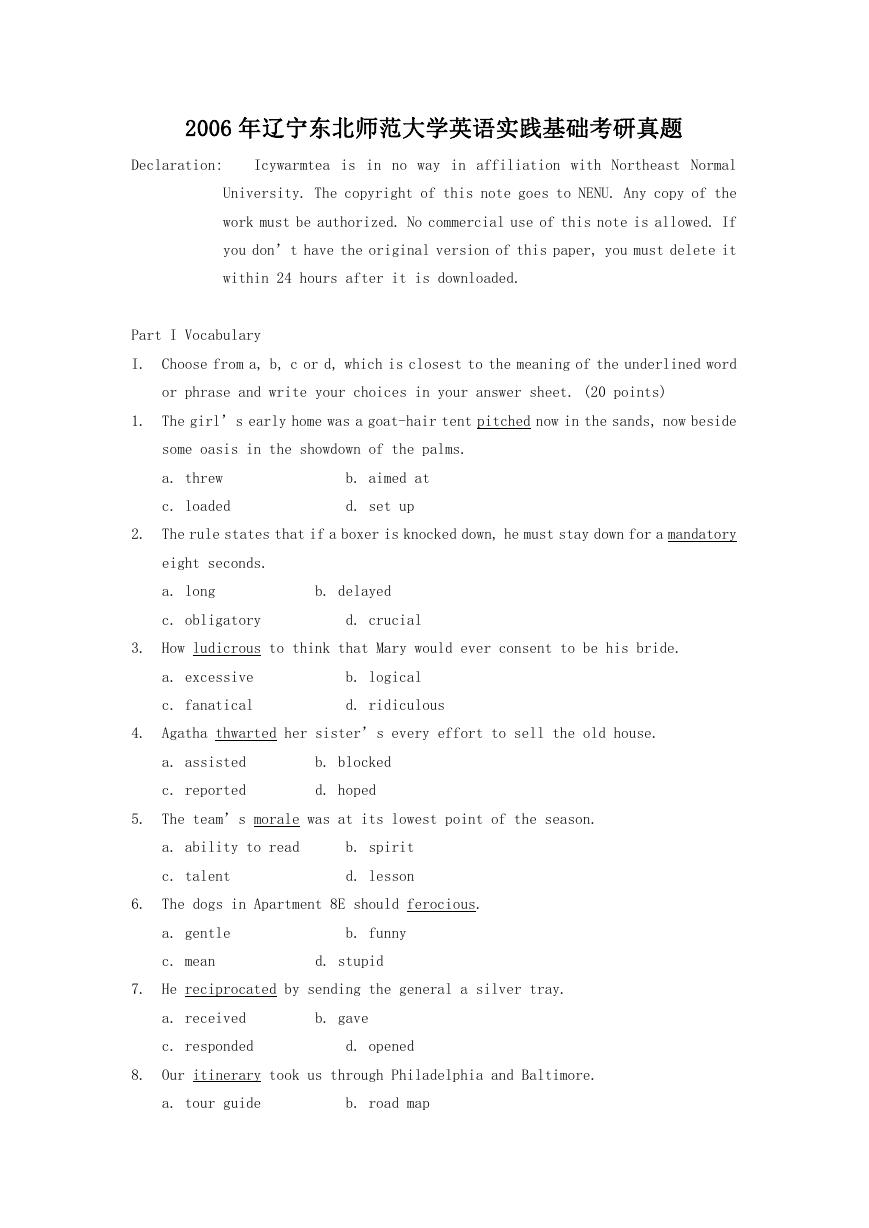

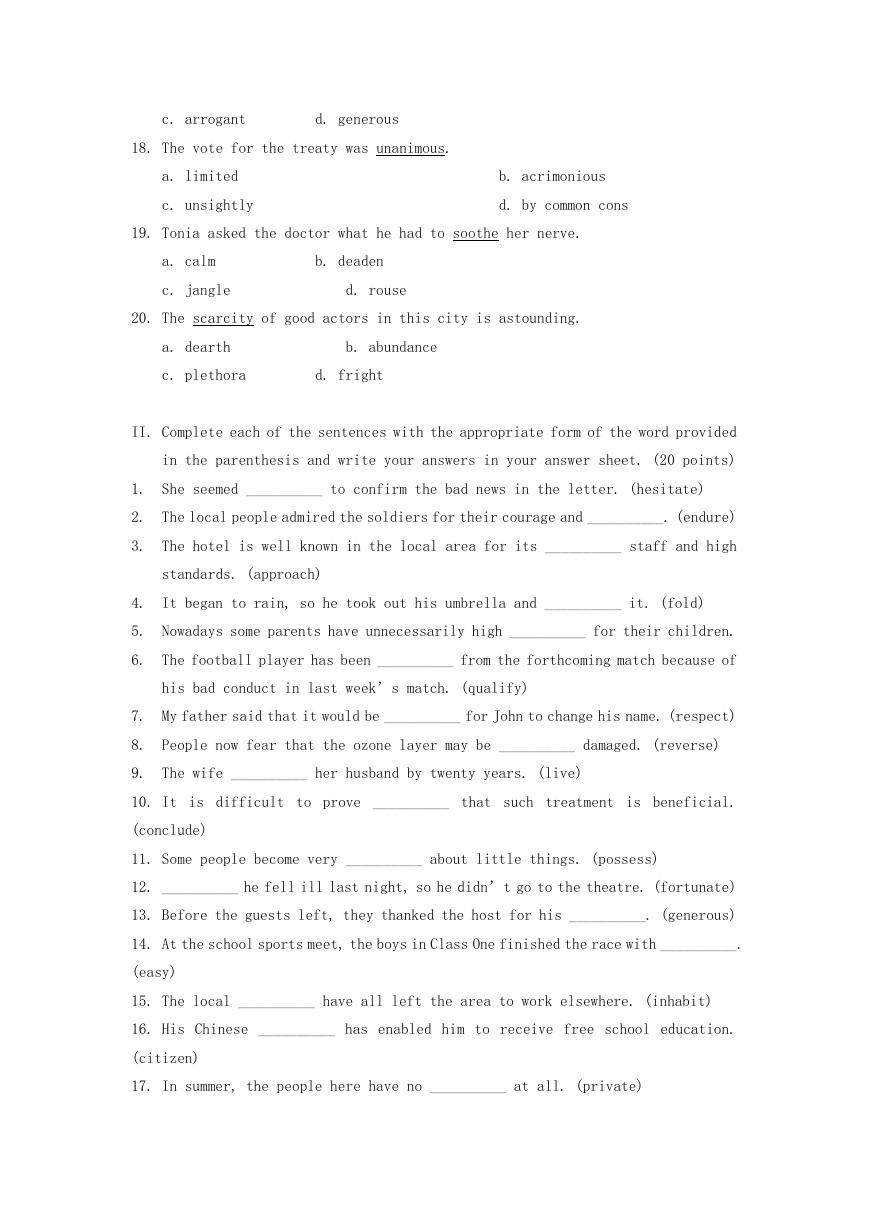
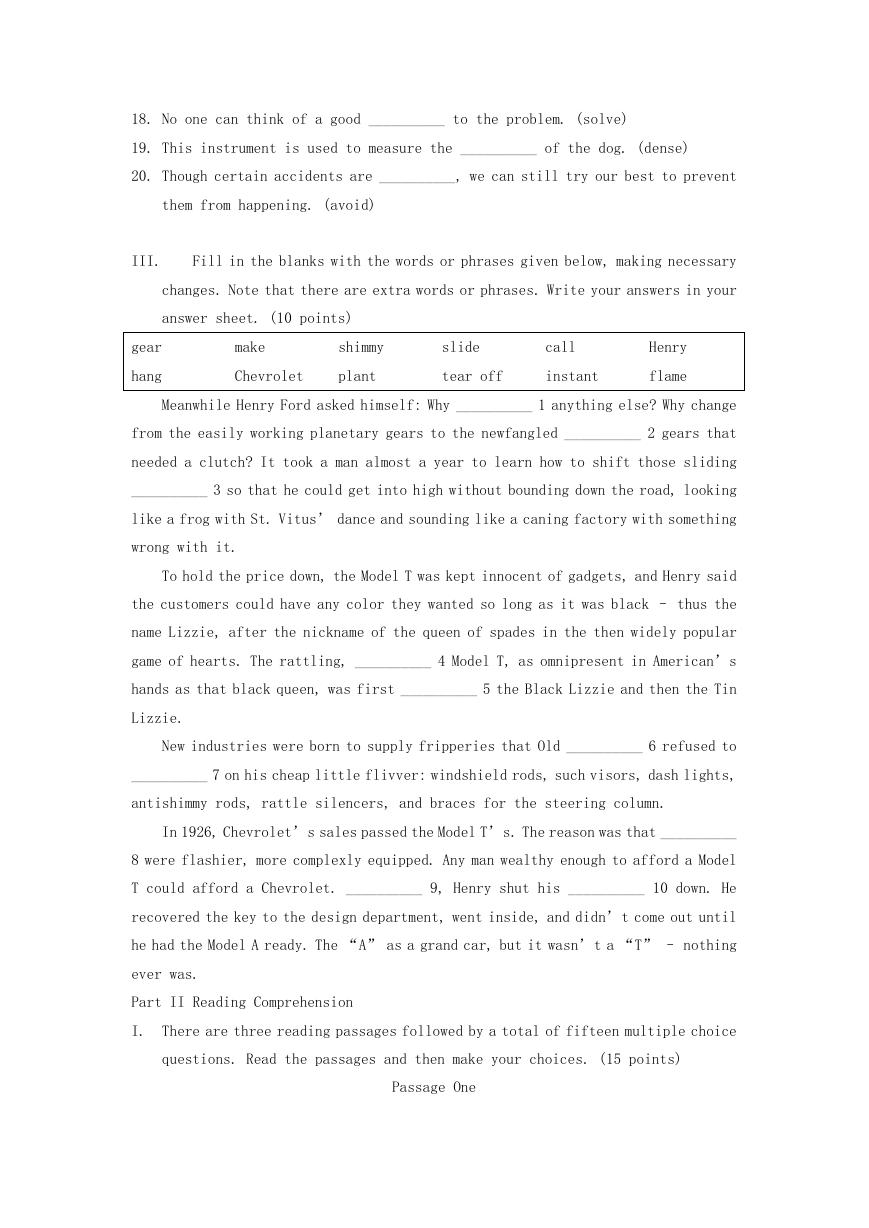


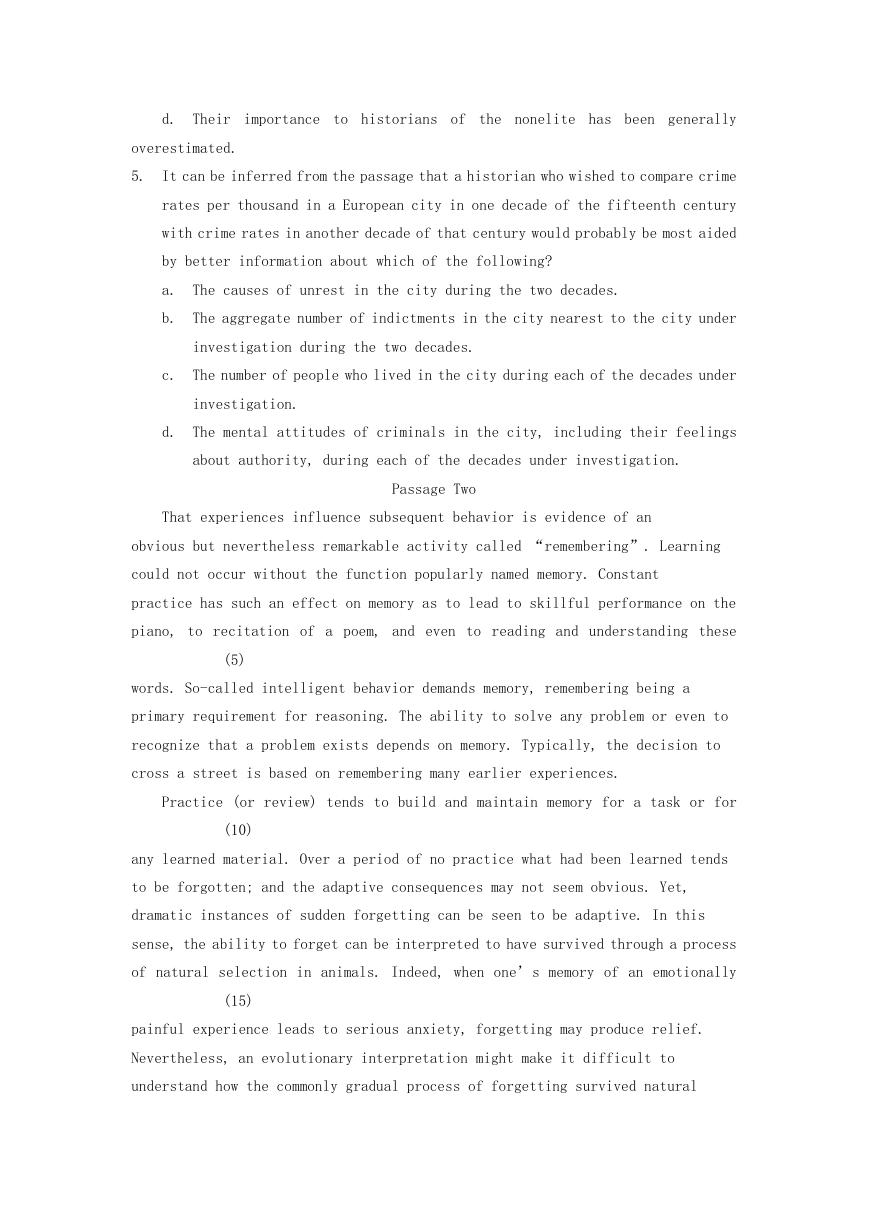
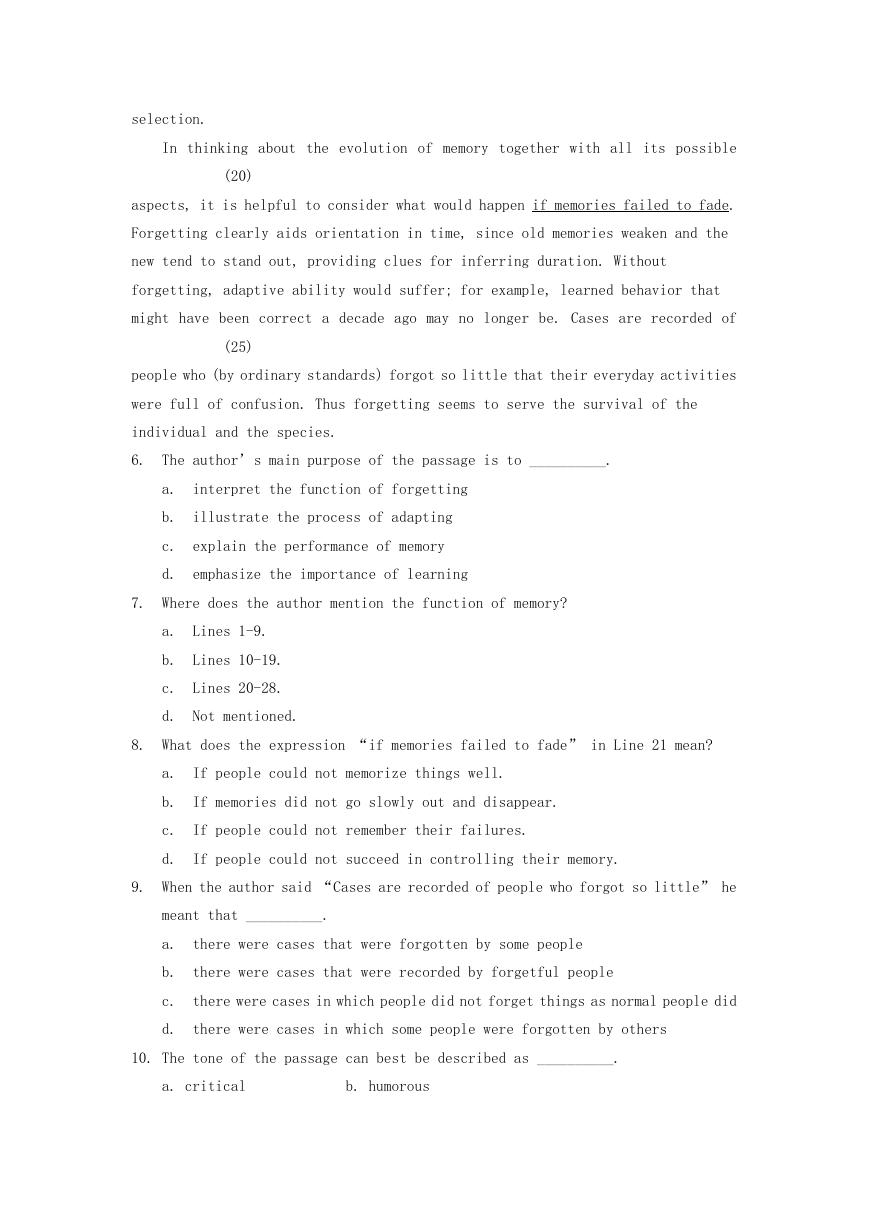








 2023年江西萍乡中考道德与法治真题及答案.doc
2023年江西萍乡中考道德与法治真题及答案.doc 2012年重庆南川中考生物真题及答案.doc
2012年重庆南川中考生物真题及答案.doc 2013年江西师范大学地理学综合及文艺理论基础考研真题.doc
2013年江西师范大学地理学综合及文艺理论基础考研真题.doc 2020年四川甘孜小升初语文真题及答案I卷.doc
2020年四川甘孜小升初语文真题及答案I卷.doc 2020年注册岩土工程师专业基础考试真题及答案.doc
2020年注册岩土工程师专业基础考试真题及答案.doc 2023-2024学年福建省厦门市九年级上学期数学月考试题及答案.doc
2023-2024学年福建省厦门市九年级上学期数学月考试题及答案.doc 2021-2022学年辽宁省沈阳市大东区九年级上学期语文期末试题及答案.doc
2021-2022学年辽宁省沈阳市大东区九年级上学期语文期末试题及答案.doc 2022-2023学年北京东城区初三第一学期物理期末试卷及答案.doc
2022-2023学年北京东城区初三第一学期物理期末试卷及答案.doc 2018上半年江西教师资格初中地理学科知识与教学能力真题及答案.doc
2018上半年江西教师资格初中地理学科知识与教学能力真题及答案.doc 2012年河北国家公务员申论考试真题及答案-省级.doc
2012年河北国家公务员申论考试真题及答案-省级.doc 2020-2021学年江苏省扬州市江都区邵樊片九年级上学期数学第一次质量检测试题及答案.doc
2020-2021学年江苏省扬州市江都区邵樊片九年级上学期数学第一次质量检测试题及答案.doc 2022下半年黑龙江教师资格证中学综合素质真题及答案.doc
2022下半年黑龙江教师资格证中学综合素质真题及答案.doc